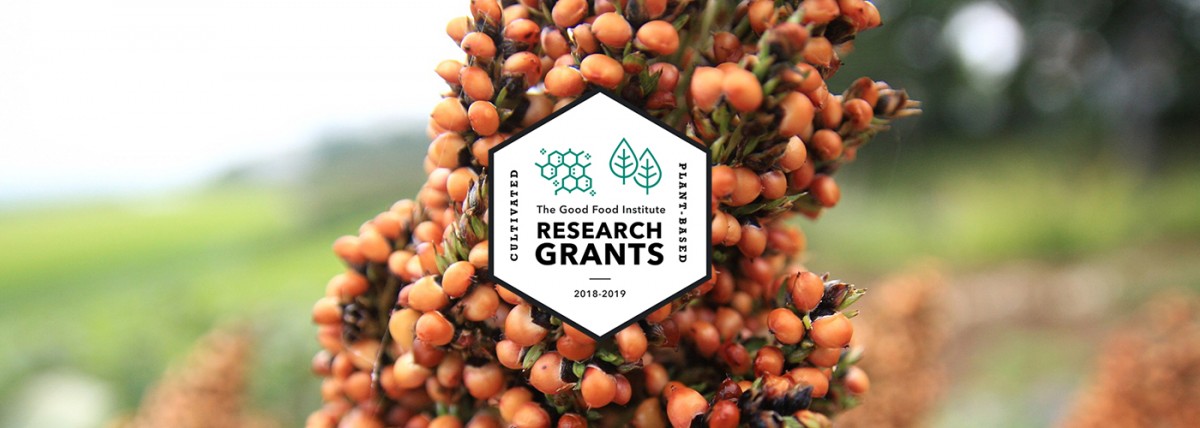Optimizing peas and sorghum for plant-based meat

GFI research grant recipient and pulse crop physiologist Dr. Dil Thavarajah and her collaborators are breeding organic field pea and sorghum varieties. Their research will improve our understanding of the nutritional and functional properties of these crops and identify cultivars with superior protein quality. Dil brings 12 years of experience in plant biochemistry and human nutrition to the field. Her end goal? To create sustainable, high-quality protein sources for plant-based meat.
How will your research advance plant-based protein?
In Western countries, we consume about three times more protein than we need but lack fiber in our diets. In developing countries, reliable and diverse food sources are scarce, resulting in chronic undernutrition. Both of these are examples of malnutrition: a deficiency, excess, or imbalance of nutrients. The goal of my research program is to link modern plant breeding with human nutritional needs to build healthy food systems.
As it relates specifically to plant-based protein, the main objective of my GFI-funded research is to characterize the protein quality and digestibility of organic field pea and sorghum proteins towards developing novel plant-based protein products like plant-based meat. Ultimately, we hope to select field pea and sorghum germplasm (meaning seeds and other living genetic material needed for plant breeding) with superior protein quality and digestibility.
This type of multidisciplinary research from field to fork requires collaboration across a variety of expertise areas. While I focus on breeding pulse crops like field pea, Dr. Rick Boyles and Dr. Stephen Kresovich focus on the breeding and genetics of sorghum. Once we move from the field to the lab and need to figure out how to turn these crops into ingredients and ultimately plant-based meat, Dr. Pushparajah Thavarajah’s food chemistry and product development expertise is invaluable.
Why did you choose to work with pulses such as pea?
As I grew up eating lentils, I am a big fan of pulse proteins. Aside from a personal interest, I started studying organic pulse proteins in response to increasing awareness of food-related diseases. Consumer demand for organically-grown plant-based protein is growing. The field pea is an excellent candidate for meeting increasing consumer demands and has been successfully used as a protein source for plant-based foods from meat to milk and more.
Sorghum is an equally well-suited cereal. This ancient grain has tremendous natural genetic diversity with respect to nutritional traits. Unfortunately, isolating sorghum protein is more difficult than isolating pulse proteins. This has likely led to limited exploration of sorghum protein as an ingredient for plant-based meat.

Why are you studying field pea and sorghum in tandem?
Developing a single protein source may not be the best approach to combat global protein malnutrition or to create diverse and tasty plant-based meat products. From a nutritional perspective, combining pulse and cereal proteins (like pea and sorghum) creates a more balanced amino acid profile than what either protein has on its own. From a functional perspective, a combination of proteins from two or more sources may lead to improved texture or taste of the final consumer product. That’s why we are combining field pea protein with sorghum protein as an ingredient for plant-based meat products.
How will you improve the nutritional traits of the plants themselves?
The first step is phenotyping and genotyping the nutritional traits of seeds. We want to understand the genomic regions that control the concentration and bioavailability of nutrients before breeding the plants. We will then establish an organic pulse crop breeding pipeline. We aim to develop techniques to breed plant cultivars with a balanced essential amino acid profile, high protein levels, and superior digestibility.
How does growing crops organically affect their protein quality?
There is still so much we can learn from a scientific and technical standpoint to help advance the plant-based meat industry. But these “learnings” aren’t merely academic. Our project integrates research on crop genetics, ingredient processing, and end-product nutrition and sensory characteristics. This approach, combined with our focus on organic pulse crop production, has the potential to lead to more and better plant-based meat products as well as human health benefits, improved soil health, and more sustainable cropping systems.
Want to learn more about scientists transforming the conventional meat market? Check out all the 2019 Research Grant recipients here!

